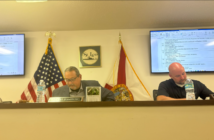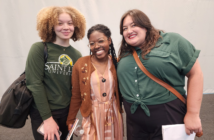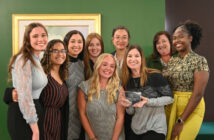By Britney Jackson
On Nov. 1, the Catholic campus of Saint Leo University received a taste of another important religious culture when it welcomed Rabbi Abraham Skorka.
Skorka is an Argentinian Rabbi and biophysicist and rector of the Seminario Rabinico Latinoamericano in Buenos Aires. Skorka, who is frequently referred to as the “Pope’s Rabbi,” has become rather famous for his close relationship with Pope Francis. What is remarkable about the relationship between Skorka and Francis is that these two leaders epitomize not only the sort of dialogue and mutual respect called for by the Second Vatican Council’s declaration, Nostra Aetate, but their friendship also symbolizes aspects of the cooperation and partnership that is now called for as the next step in the new era of Jewish-Christian relations.
Having Rabbi Skorka grace the University has shed light on the inner workings of the Center for Catholic-Jewish Studies (CCJS), which was founded in 1998 by Arthur F. Kirk Jr. (Saint Leo’s Former President) and Rabbi James Rudin. The Center has been around for nearly two decades carries a strong sense of respect, understanding, and appreciation between the Jewish, the Catholic and all other faiths that have joined them in building opportunities for interreligious education and dialogue.
Dr.Matthew A. Tapie brought together several Rabbi’s and Father’s to attend a panel to inform students about the relationships and bonds that are forming in the Christian religion. The first of these gentlemen to speak was Rabbi Jason Rosenberg.
“My family and I counted churches on our way to my in-laws in Florida; this was so I’d know where to start my interfaith work.”
Rabbi Rosenberg found such a task difficult since there are so many different settings and religions here in Florida. Still, he believes that interfaith mass meetings are extremely inefficient; everything stays on the surface, and it does not go anywhere because of differing beliefs. He doesn’t agree with what other dominations believe and other dominations don’t believe what he believes. This is because they each have their own interpretation of the Bible and rules that they abide by. Though he does not agree with all of them, Rosenberg is trying to get a better understanding of the workings of other faiths.
Father Robert J. Schneider, the interfaith director for the diocese in St. Petersburg, has partnered with the Jewish on many occasions and invited all faiths to be a part of his ministry.Schneider works closely with various charity organizations, such as FAST and HOPE, to help troubled youths.
Deacon Jim Grevenites works with Father Schneider. When Grevenites was coming to Florida, he was shocked to learn that 20% of persons in each county were not affiliated with any religion.
“I felt uncomfortable in Illinois when I lived there because of the religious conflicts that always occurred,” said Grevenites.
Together, Schneider and Grevenites try to represent other faiths and work against the death penalty, which goes against the Catholic faith. Grevenites was invited to the Holocaust museum and was extremely happy to be welcomed with open arms.
“I want everyone to walk in with an open mind and faith when all the Christians faiths come together because God is with us all,” Grevenites concluded.
Father Patrick O’Neil is the President of theology and the Archdiocese at St. Thomas University in Miami, states that “We are indebted to out Jewish brothers and sisters for bringing light to certain things that are going on in the world.”
O’Neil has done a lot of work over a period of 50 years; he’s held numerous about prayer and theology, as well as conducted 92 Jewish weddings.
“This is all about building relationships locally and about the historicalness of all faiths since we all have things in common,” O’Neil stated.
O’Neil had been St. Thomas University’s president four years in a row and has award ten Rabbis with degrees throughout those years. He is well versed in the history of the Holocaust, and he hopes his successor will continue the tradition of teaching the students about that important time in history.
The views of Rabbi Richard J. Birnholz, who is the first German-American in his family, have been shaped by his own history. His father was originally from Germany during Hitler’s reign. His father asked a Catholic nursing home to take in his mother under a Catholic name so that the Nazi’s could not find her.
Birnholz teaches seventh graders about Catholic-Jewish relations, and in turn, the Jewish children teach the Catholic children about their religion. He does most of his teaching in Corpus Christi, where he also participates in a program that builds homes for the less fortunate. Birnholz
also took a trip to Israel with members of the Presbyterian and Jewish faiths. The trip was their way of not letting doctrine/belief get in the way of coming together as one religion.
Deacon Patrick Macaulay is fundamental to the creation of the Catholic-Jewish relations. He closely follows St. John Paul’s doctrine, which is Pope John Paul II’s philosophical and theological teachings and writings.
“I do not believe in paralogy, but in educating the future. I am making sure that bigotry is not in the Catholic school tradition,” said Macaulay.
Macaulay also discussed the Feast of Abraham, a celebration initiated in 2000 by Reverend Fausto Stampiglia, pastor of St. Martha’s Church. During the celebration, three faiths came together (the Catholic, the Jewish and the Muslim) and took a mutual pledge to support each other. The pledge was meant to end the genocide of a faith/race and to bring awareness of acts of cruelty, such the Holocaust and the recent unfair treatment of the Muslim people in the light of the growing ISIS threat,
The information and stories that were shared during the panel were inspiring and touching. Interfaith is slowly having a huge impact on the world; it is not every day you hear about multiple Christian faiths coming together to learn about each other’s religion and stand with each other during times of need. Today, when the world is stereotyping certain individuals and making grave assumptions about a religion, it’s nice to know that some people can see past differences and find a common bond.




